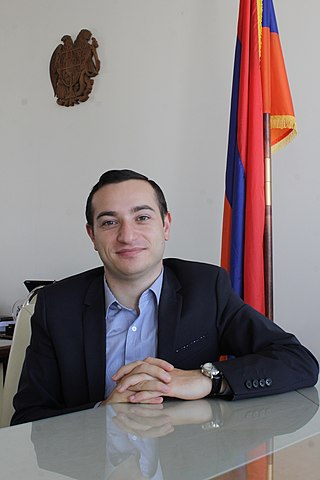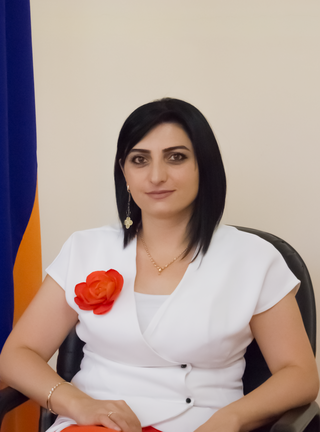Related Research Articles

The Republican Party of Armenia is a national-conservative political party in Armenia led by the third president of Armenia, Serzh Sargsyan.

Vazgen Mikayeli Manukyan is an Armenian politician who served as the first Prime Minister of Armenia from 1990 to 1991. From 1992 to 1993, during the First Nagorno-Karabakh War, Manukyan was acting Defence Minister of Armenia. He was also a member of Armenia's parliament from 1990 to 2007.

Heritage is an Armenian national liberal political party. It was founded in 2002 by Raffi Hovannisian, independent Armenia's first Foreign Minister.

The Kurds in Armenia, also referred to as the Kurds of Rewan, form a major part of the historically significant Kurdish population in the post-Soviet space, and live mainly in the western parts of Armenia.

Nikol Vovayi Pashinyan is an Armenian politician serving as the prime minister of Armenia since 8 May 2018.

Stepanakert Airport or Khojaly Airport is an airport in the town of Khojaly, 10 kilometers north-east of Stepanakert, Azerbaijan. The airport, in the Nagorno-Karabakh region, had been under the control of the self-proclaimed Republic of Artsakh from 1992 to 2023. Flights ceased with the escalation of the First Nagorno-Karabakh War in 1990.

Western Azerbaijan is an irredentist political concept that is used in the Republic of Azerbaijan mostly to refer to the territory of the Republic of Armenia. Azerbaijani officials claim that the territory of the modern Armenian republic were lands that once belonged to Azerbaijanis. Its claims are primarily hinged over the contention that the current Armenian territory was under the rule of various Turkic tribes, empires and khanates from the Late Middle Ages until the Treaty of Turkmenchay (1828) signed after the Russo-Persian War of 1826–1828. The concept has received official endorsement by the government of Azerbaijan, and has been used by its current president, Ilham Aliyev, who, since around 2010, has made regular reference to "Irevan" (Yerevan), "Göyçə" and "Zangazur" (Syunik) as once and future "Azerbaijani lands". The irredentist concept of "Western Azerbaijan" is associated with other irredentist claims promoted by Azerbaijani officials and academics, including the "Goycha-Zangazur Republic" and the "Republic of Irevan."

Zaruhi Postanjyan is an Armenian Member of Parliament since 2007, a public activist and a member of Heritage board. She was the head of "Heritage" faction of National Assembly of Armenia.

The political status of Nagorno-Karabakh remained unresolved from its declaration of independence from the Soviet Union on 10 December 1991, to its September 2023 collapse. During Soviet times, it had been an ethnic Armenian autonomous oblast of the Azerbaijan Soviet Socialist Republic. Following the dissolution of the Soviet Union, a conflict arose between local Armenians who sought to have Nagorno-Karabakh join Armenia and local Azerbaijanis who opposed this.
Samvel Karapetyan is a Russian-Armenian billionaire businessman who owns the Tashir Group conglomerate.

Caviar diplomacy is a lobbying strategy of Azerbaijan, consisting of costly invitations to foreign politicians and employees of international organizations to Azerbaijan at the expense of the host country. Caviar diplomacy also includes expensive gifts presented as "a tribute to the Eastern tradition."

Mkhitar Hayrapetyan is a Member of Armenian National Assembly from My Step Alliance, member of the Civil Contract party, former Minister of Diaspora of Armenia, turkologist. On December 9, 2018 Hayrapetyan was elected as a Member of the National Assembly of Armenia from the territorial electoral list of the electoral district #1 of the “My Step” alliance of parties. Since 18 January, 2019 Hayrapetyan is the Chairman of the Standing committee on Science, Education, Culture, Diaspora, Youth and Sport. Also, the Head of Armenian delegation at Euronest Parliamentary Assembly. Mkhitar Hayrpetyan and Sebastian Kurz were the only ministers in Europe to be assigned to their role at the age of 27.։
Naira Zohrabyan is an Armenian politician who was a member of the National Assembly of Armenia for the Prosperous Armenia party.

The 2020 Nagorno-Karabakh ceasefire agreement was an armistice agreement that ended the Second Nagorno-Karabakh War. It was signed on 9 November by the President of Azerbaijan Ilham Aliyev, the Prime Minister of Armenia Nikol Pashinyan and the President of Russia Vladimir Putin, and ended all hostilities in the Nagorno-Karabakh region from 00:00, on 10 November 2020 Moscow time. The president of the self-declared Republic of Artsakh, Arayik Harutyunyan, also agreed to an end of hostilities.

Taguhi Tovmasyan Deputy of the 7th convocation of the National Assembly of Armenia, Guide-translator (English), journalist, politician.

The Conservative Party is a political party in Armenia. It was founded in 1991.

Armenia Alliance is an Armenian political alliance. It was founded in 2021 and is currently led by former President of Armenia Robert Kocharyan.
Azerbaijan has been a member of the Council of Europe, an international organization that focuses on strengthening democracy and human rights, since 2001. As a member, it has attracted attention for holding political prisoners, low implementation of verdicts of the European Court of Human Rights (ECtHR), and bribing Council of Europe parliamentarians to suppress negative information about its human rights record. In 2017, the Committee of Ministers launched the first ever infringement proceeding against Azerbaijan after it refused to release opposition politician Ilgar Mammadov after a 2014 ECtHR verdict that his imprisonment was unlawful. There has also been criticism of Azerbaijan's continued membership by those who believe its lack of human rights protection undermines the credibility of the Council of Europe.

The 2022 Armenian protests were a series of anti-government protests in Armenia that started on 5 April 2022. The protests continued into June 2022, and many protesters were detained by police in Yerevan. Protestors demanded Prime Minister of Armenia Nikol Pashinyan resign over his handling of the 2020 Nagorno-Karabakh war. On 14 June 2022, the opposition announced their decision to terminate daily demonstrations aimed at toppling Prime Minister Nikol Pashinyan after failing to achieve popular support.

On 12 September 2022, a series of clashes erupted between Armenian and Azerbaijani troops along the Armenia–Azerbaijan border, marking a major escalation in the current border crisis between Armenia–Azerbaijan and resulting in nearly 300 deaths and dozens of injuries on both sides by 14 September. At least 204 Armenian servicemen were killed or went missing, according to a report by Armenian Prime Minister Nikol Pashinyan. Azerbaijan acknowledged 80 fatalities among its forces, bringing the total number of killed to at least 284. A number of English-language sources refer to the episode as the 'Two-Day War,' to distinguish it from the wider crisis, while journalist Gabriel Gavin writing in The Spectator described the conflict as "Europe's newest war."
References
- 1 2 3 4 5 6 7 "Tatevik Hayrapetyan". www.parliament.am. National Assembly of Armenia . Retrieved 2021-07-24.
- ↑ "Tatevik Hayrapetyan". Parliamentary Assembly of the Council of Europe . Retrieved 24 July 2021.
- ↑ "Armenian soldiers on trial in Azerbaijan | Eurasianet". eurasianet.org. Retrieved 2021-07-24.
- 1 2 "Tatevik Hayrapetyan raised issue of Armenian prisoners of war in PACE". www.1lurer.am. 21 June 2021. Retrieved 2021-07-24.
- ↑ "Armenian delegation members ask PACE rapporteur Paul Gavan to visit Armenian captives in Baku". armenpress.am. Retrieved 2021-07-24.